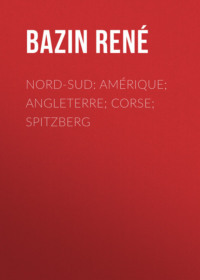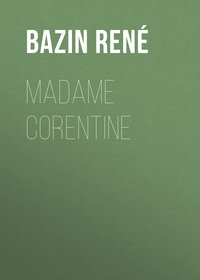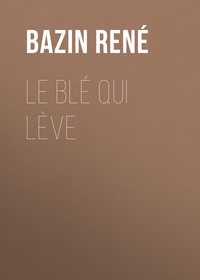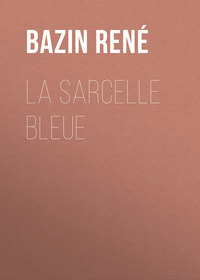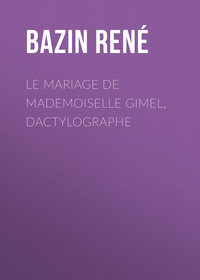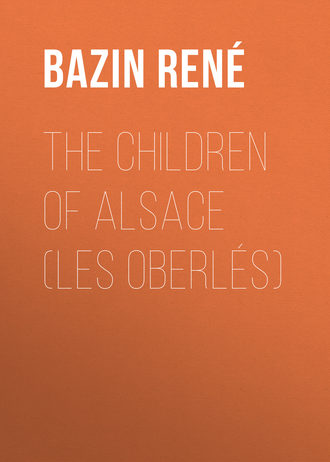 полная версия
полная версияThe Children of Alsace (Les Oberlés)
"The Prefect, there he is – he is going to pass."
The farmer, drawn from his work by the women's sudden silence as much as by the child's voice, turned towards the yard where the hop-pickers were listening motionless to the noise of the wheels and the horses coming nearer. He commanded:
"Shut the cart-door, Franzele!"
He added, muttering:
"I will not let him see how it is done here – in my place!"
The little girl pushed-to one of the sides of the door, then curious, having stuck her head out again:
"Oh, how funny. Well, he cannot say that he saw many people. They have not disturbed themselves much on his account! There are only the German women of course. They are all there near 'la Cigogne.'"
"Will you shut that door?" replied the farmer angrily.
This time he was obeyed. The second side of the door shut quickly against the first. The twenty persons present heard the noise of the carriage rolling in the silence of the town of Alsheim. There were eyes in all the shadowy corners behind the windows – but no one went outside their doors, and in the gardens the men who were digging the borders seemed so entirely absorbed in their work as to have heard nothing.
When the carriage was about fifty yards past the farm, their imaginations were full of what it would be like at the Oberlés' farther on at the other end of the village, and taking up a handful of hop-stalks, the women and girls asked each other curiously what the son of M. Oberlé was going to do – and they looked stealthily towards the barn. He was no longer there.
He had risen, that he might not break his word, and having run all the way, and pale in spite of his having run, he arrived at the gate of the kitchen garden at the very moment when the Prefect's carriage, on the other side of the demesne, was passing through the park gates.
All the household was ready. Lucienne and Madame Oberlé were seated near the mantelpiece. They did not speak to each other. The factory owner, who had returned from his office half-an-hour ago, had put on the coat he wore to go to Strasburg, and a white waistcoat – with his arms behind his back he watched the carriage coming round the lawn.
The programme was carried out according to the plans arranged by him. The official personage who was just entering the grounds was bringing to M. Oberlé the assurance of German favour. For a moment of inflated pride which thrilled him M. Oberlé saw in imagination the palace of the Reichstag.
"Monica," he said, turning round as breathless as after a long walk, "has your son returned?"
Seated before him in the yellow chair near the fireplace, looking very thin, her features drawn with emotion, Madame Oberlé answered:
"He will be here because he said so!"
"The fact that he is not here is more certain still. And Count Kassewitz is coming – and Victor? I suppose he is at the steps to show him in, as I told him?"
"I suppose so."
M. Joseph Oberlé, furious at the constraint of his wife – at her disapproval, which he encountered even in this submission, crossed the room and pulled the old bell rope violently, and opening the door which led to the hall saw that Victor was not in his place.
He had to draw back, for the sound of footsteps coming up were mingled with the sound of the bell.
M. Joseph Oberlé placed himself near the fireplace facing the door – near his wife. Footsteps sounded on the gravel, on the granite of the steps. However, some one had come in answer to the bell. The door was pushed open the next moment and the Oberlés perceived at the same time that the old cook Salomé, white as wax, her mouth set, was opening the door without saying a word, and M. von Kassewitz close behind her was coming in.
He was very tall, very broad shouldered, and clad in a tight-fitting frock-coat. His face was composed of two incongruous elements, a round bulging forehead, round cheeks, a round nose, then standing straight out from the skin in stiff locks, eyebrows, moustache, and short, pointed beard. This face of a German soldier composed of points and arches was animated by two piercing lively eyes, which ought to have been blue – for his hair was yellow – but which never showed clearly through the shadow of the spreading eyebrows, and because of the man's habit of screwing up his eyelids. His hair, sparse on the top, was brushed up well from the occiput to just above the ears.
M. Joseph Oberlé met him and spoke in German.
"M. Prefect, we are very greatly honoured by this visit. Really to have taken this trouble!"
The official took the hand that M. Oberlé held out, and pressed it. But he did not look at him and he did not stop. His steps sounded heavily on the thick drawing-room carpet. He was looking at the thin apparition in mourning near the fireplace. And the enormous man bowed several times very stiffly.
"The Count von Kassewitz," said M. Oberlé – for the Prefect had never been introduced to the mistress of the house.
She made a slight movement of the head and said nothing. M. von Kassewitz drew himself up, waited a second, then playing his part and affecting good humour, which perhaps he did not feel, he greeted Lucienne, who had blushed, and was smiling.
"I remember having seen Mademoiselle at His Excellency the Statthalter's," he said. "And truly Strasburg is some distance from Alsheim. But I am of the opinion that there are some wonders which are better worth the journey than the ruins in the Vosges, M. Oberlé."
He laughed with a satisfied air, and sat on the yellow couch with his back to the light, facing the fireplace. Then turning to the factory owner, who was seated near him he asked:
"Is your son away?"
M. Oberlé had been listening anxiously for a minute. He was able to say:
"Here he is."
The young man came in. The first person he saw was his mother. That made him hesitate. His eyes, young and impressionable, gave a nervous twitch as if they were hurt. Quickly he turned to the sofa, took the hand which the visitor offered him, and gravely but less embarrassed than his father, and with greater coolness he said in French:
"I have just been for a walk. I had to run not to be late, for I promised my father I would be here when you came."
"You are too kind," said the official, laughing. "We speak German with your father, but I am able to carry on a conversation in another tongue besides our national language."
He went on in French, laying stress on the first syllables of the words.
"I admired your park, Monsieur Oberlé, and even all the little country of Alsheim. It is very pretty. You are surrounded, I believe, by a refractory population – almost invisible; in any case, just now as I came through the village I hardly saw a living soul."
"They are in the fields," said Madame Oberlé.
"Who is the Mayor, then?"
"M. Bastian."
"I remember them: a family very much behind the times."
His look was questioning, and he moved his heavy head towards the two women and Jean. Three answers came at once.
"Behind the times, yes," said Lucienne – "they are, but such good people."
"They are simply old-fashioned folk," said Madame Oberlé.
Jean said:
"Above all very worthy."
"Yes, I know what that means."
The Prefect made an evasive gesture.
"Well, provided they go straight."
The father saved the situation.
"We have but few interesting things to show you, but perhaps you would like to see my works? They are full and animated, I assure you. There are one hundred workmen, and machines at work – pines sixty feet long under the branches, are reduced in three minutes to planks, or cut up as rafters. Would you care to see them?"
"Yes, certainly."
The conversation, thus turned in another direction at once became less constrained. The origin of the Oberlés' works, the Vosges woods, the comparison between the German manner of felling, by the Government, and the French system, by which the owners of a portion of a forest may fell the trees themselves under the supervision of the foresters – all these questions gave each a chance to speak. Lucienne became lively, Madame Oberlé, questioned by her husband, answered. Jean also spoke. The functionary congratulated himself on having come.
When her father made a sign, Lucienne rose, to ring for the footman and to ask that some refreshment might be served. But she had not time to make a single step.
The door opened, and Victor, the servant who had not been at his post a short time ago, appeared, very red, very embarrassed, and lowering his eyes. On his left arm, holding himself as erect as possible, was the grandfather, M. Philippe Oberlé.
The five persons talking were all standing. The servant stopped at the door and withdrew. The old man came in alone, leaning on his stick. M. Philippe Oberlé had put on his best clothes belonging to the time when he was in good health. He wore, unbuttoned, the frock-coat which was still decorated by the ribbon of the Legion of Honour. Intense feeling had transfigured him. One would have said that he was twenty years younger. He came forward taking short steps – his body bent a little forward, but his head held stiffly erect, and he looked at one man only, the German official standing by the side of the couch. His heavy jaw trembled and moved convulsively as if he were articulating words they could not hear.
Was M. Joseph Oberlé mistaken, or did he wish to put him on the wrong scent? He turned to where M. von Kassewitz was standing, astonished and on his guard, and said:
"My father has surprised us by coming down. I never expected he would take part in this."
The eyes of the old deputy, rigid under their heavy lids, did not cease looking at the German, who kept his countenance and remained silent. When M. Philippe Oberlé was three feet from M. von Kassewitz he stopped. With his left hand, which was free, he then drew his slate from the pocket of his frock-coat, and held it out to the Count von Kassewitz: on it two lines were written. The Count bent forward and then drew himself up haughtily.
"Sir!"
Already M. Joseph Oberlé had seized the thin sheet of slate, and read these words, traced with remarkable decision:
"I am in my own house, sir!"
The eyes of the old Alsatian added:
"Leave my house!" and they were no longer looking down, nor did they leave the enemy.
"This is too much!" said M. Joseph Oberlé. "Father, how could you come downstairs to insult my guests? You will excuse him, sir; my father is old, over-excited, a little touched by age."
"If you were younger, sir," said M. von Kassewitz in his turn, "we should not stop at this. You will do well to remember that you are also in my home, in Germany, on German territory, and that it is not well even at your age to insult authority."
"Father," said Madame Oberlé, hastening to the old man to support him, "I beg of you – you are doing harm to yourself – this emotion is too much for you."
An extraordinary thing happened. M. Philippe Oberlé, in his violent anger, had found strength to stand upright. He appeared gigantic. He was as tall as M. von Kassewitz. The veins on his temples swelled – the blood was in his cheeks, and his eyes were living once more. And at the same time the half-dead body was trembling and using up in involuntary movements its fragile and factitious life. He signed to Madame Oberlé to stand aside, and not to hold him up.
Lucienne, grown pale, shrugged her shoulders and went towards M. von Kassewitz.
"It is only an act in one of our family tragedies, monsieur. Do not take any notice of it and come to the works with us. Let me pass, grandfather."
The Count took no notice, and she passed out between M. Philippe Oberlé and the functionary who said:
"You are not responsible, mademoiselle, for the insult that has been offered to me. I understand the situation – I understand."
His voice came with difficulty from his contracted throat. Furious – half a head taller than any one there except M. Philippe Oberlé – M. von Kassewitz turned on his heel and went towards the door.
"Come, I pray you," said M. Joseph Oberlé, standing aside to let the Prefect pass.
Lucienne was already outside. Madame Oberlé, as ill from emotion as the old man, who refused her assistance, feeling her tears choke her, ran into the hall and up to her room, where she burst into sobs.
In the drawing-room Jean was alone with the old chief, who had just driven out the stranger. He drew near and said:
"Grandfather, what have you done?"
He wanted to say: It is a terrible insult. My father will never forgive it. The family is completely broken up. He would have said all that. But he raised his eyes to the old fighter, so near the end, still showing fight. He saw now that the grandfather was gazing fixedly at him; that his anger had reached its height; that his chest was moving violently; that the face grimaced and twisted. And suddenly, in the yellow drawing-room, an extraordinary voice, a hoarse voice, powerful and husky, cried out in a kind of nervous gallop:
"Go away! Go away! Go away! Go away!"
The voice rose to a piercing note. Then it broke, and with his mouth still open, the old man reeled and fell on the floor. The voice had sounded to the inmost recesses of the house. This voice that no one ever heard now, Madame Oberlé had recognised it, and through the open door of her room she had been able to catch the words. It was only a cry of rage and suffering, or the contrary to M. Joseph Oberlé, when the terrible sound of the words, which could not be distinguished or guessed at, reached him down two-thirds of the garden path. He had turned for a moment, with a frown – while the foremen and German workmen of the factory greeted M. von Kassewitz with their cheers – then he went on towards them.
Madame Oberlé was the first to run to the drawing-room, then Victor, then old Salome, as white as a sheet, crying with uplifted hands:
"Was not that M. Philippe I heard?"
Then the coachman and the gardener ran in, hesitating to come forward but curious to see this distressing scene. They found Jean and his mother kneeling near M. Philippe Oberlé, who was breathing with difficulty, and was in a state of complete prostration. His effort, his emotion, and his indignation had used up the strength of the old man. They raised him up, and sat him in a chair, and each one tried to revive him. For a quarter of an hour there was going and coming between the first floor and the dining-room. They fetched vinegar, salts, and ether.
"I was afraid that master would have an attack; he has been beside himself all the morning. Ah, there he is moving his eyes a little. His hands are not so cold.
Across the park there came a cry of "Long live the Prefect!" It entered the drawing-room wafted on the warm breeze, where such words had never been heard before. M. Philippe Oberlé did not seem to hear them. But after some minutes he made a sign that he wished to be taken to his room.
Some one came up the steps quickly, and before coming in asked:
"What, again! What are those cries? Ah! my father!"
He changed his tone and said:
"I thought it was you, Monica – that you had a nervous attack. But then who screamed like that?"
"He!"
"He?" said M. Oberlé; "that is not possible!"
He did not dare to ask the question again. His father, now standing, supported by Jean and by his servant, trembling and wavering, moved across the room.
"Jean," said Madame Oberlé, "see to everything. Do not leave your grandfather; I am coming up."
Her husband had kept her back. She wished to get Jean away from this. As soon as she was alone with M. Oberlé on the staircase they heard the noise of footsteps and the rustling of materials, and voices saying:
"Hold him up – take care in turning."
"What did he call out?" asked M. Oberlé.
"He called out: 'Go away! Go away!' Those are words that he often uses, you know."
"The only ones he had at his disposal to show his hatred. Did he say nothing else?"
"No. I came down at once and I found him on the floor. Jean was near him."
"Happily M. von Kassewitz did not witness this second act. The first was enough. In truth, the whole household was leagued together to make this visit – such an honour for us – an occasion of offence and scandal: my father; Victor, who was not ashamed to be an accomplice of the delirious old man; Jean, who was impertinent; you – "
"I did not think you could have had to complain of me!"
"Of you the very first! It is you who are the soul of this resistance, which I will overcome. I shall overcome it! I answer for that."
"My poor friend," she said, clasping her hands; "you are still set on that!"
"Exactly."
"You cannot overcome everything, alas!"
"That is what we are going to see."
Madame Oberlé did not answer and went upstairs quickly. A new anxiety, stronger than the fear of her husband's threats, tortured her now.
"What did my father-in-law wish to say?" she asked herself. "The old man is not delirious. He remembers; he foresees; he watches over the house; he always thinks things out carefully. If only Jean did not understand it as I understand it!"
At the top of the stairs she met her son, who was coming out of the grandfather's room.
"Well?"
"Nothing serious, I hope – he is better – he wishes to be alone."
"And you?" questioned the mother, taking her son's hand, and leading him towards the room he used. "And you?"
"How? I?"
When he had shut the door behind her, she placed herself before him, and her face quite white in the light of the window, her eyes fixed on the eyes of her child:
"You quite understood – did you not – what grandfather wished to say?"
"Yes."
She tried to smile, and it was heart-breaking to see this effort of a tortured soul.
"Yes. He cried: 'Go away!' It is a word he often used to say to strangers. He was addressing M. von Kassewitz. You do not think so?"
Jean shook his head.
"But, my darling, he could not 'address others so!'"
"Pardon; he meant it for me."
"You are mad! You are the best friends in the world, you and your grandfather."
"Just so."
"He did not wish to turn you out of the room?"
"No."
"Then?"
"He was ordering me to leave the house."
"Jean!"
"And for all that, the poor man was delighted to see me come back to it."
Jean would not look at his mother now, because tears had gushed from Madame Oberlé's eyes, because she had come close to him, because she had taken his hands.
"No, Jean, no; he could not have meant that, I assure you; you do not understand. In any case, you will not do it! Say that you will never do it."
She waited for the answer, which did not come.
"Jean, for pity's sake answer me! Promise me that you will not leave us! Oh! what would the house be without my son now? I have only you – you do not think I am miserable enough then? Jean, look at me!"
He could not wholly resist her. She saw the eyes of her son looking at her tenderly.
"I love you with all my heart," said Jean.
"I know it; but do not go away!"
"I pity you and respect you."
"Do not go away!"
And as he said no more she moved away.
"You will promise nothing. You are hard – you also are like – "
She was going to say "Like your father."
Jean thought: "I can give her some weeks of peace; I owe them to her." And trying to smile in his turn said:
"I promise you, mamma, to be at St. Nicholas's Barracks on October 1st – I promise you. Are you pleased?"
She shook her head. But he, kissing her on the brow, not wishing to say anything more, left her in haste.
The town of Alsheim was occupying itself with the scene which had taken place at M. Oberlé's. Through the torrid evening heat, amidst the fertile dust of the cut wheat, of the pollen of flowers, of dried moss which was blown from one field to another, the men came home on foot; the children and young people came on horseback, and the tails of the horses were gold, or silver, or black, or fire-coloured in the burning light which the setting sun cast over the shoulder of the Vosges. Women were waiting for their husbands on the thresholds, and when they drew near, went to meet them in their haste to spread such important news.
"You do not know what has happened at the works. They will speak about it for a long time! It seems that old M. Philippe found his voice in his anger, and that he drove the Prussian out!"
Many of the peasants said:
"You will speak of that at home, wife, when the door is shut!"
Many remarked with anxiety the agitation of their neighbours, and said:
"This will end in a visit from the gendarmes!"
At M. Bastian's farm the women and young girls were finishing their hop-picking. They were chattering, still laughing, or anxious, according to their age. The farmer had forbidden them to reopen the door looking on to the village street. He went on, always prudent in spite of his seeming joviality, to spread out the baskets of hop flowers, shining with fresh pollen. The oxen and the horses, passing near the yard, breathed in the air and stretched their necks.
And one at a time the women got up, shook their aprons, and weary, stretched their youthful arms, yawning at the freshness of the cool puffs of air which came over the roof, then started on their more or less distant way to home and supper.
At the Oberlés' house the dinner-bell rang. The meal was the shortest and the least gay that the wainscoting and delicately tinted paintings had ever witnessed.
Very few words were exchanged.
Lucienne was thinking of the new difficulty in the way of her projected marriage and of the violent irritation of M. von Kassewitz; Jean, of the hell that this house of the family had become; M. Oberlé, of his ambitions probably ruined; Madame Monica, of the possible departure of her son. Towards the end of dinner, at the moment when the servant was about to withdraw, M. Oberlé began to say, as if he were continuing a conversation:
"I am not accustomed, you know, my dear, to give in to violence: it exasperates me, that is all. I am then resolved to do two things – first to build another house in the timber-yard, where I shall be in my own home, then to hasten on Lucienne's marriage with Lieutenant von Farnow. Neither you nor my father nor any one can stop me. And I have just written to him about it."
M. Oberlé looked at each of them – his wife, son, and daughter – with the same expression of defiance. He added:
"These young people must be allowed to see each other and to talk to each other freely, betrothed as they are."
"Oh," said Madame Oberlé, "such things – "
"They are so!" he answered, "by my will, and dating from this evening. Nothing will alter it, nothing. I cannot let them meet here, unfortunately. My father would plan some fresh scandal – or you," and he pointed to his son; "or you," and he pointed to his wife.
"You are mistaken," said Madame Oberlé. "I suffer cruelly on account of this arrangement, but I shall make no scandal which will nullify what you have decided upon."
"Then," said M. Oberlé, "you have the chance to prove your words. I was not going to ask you to do anything, and I had decided to take Lucienne to Strasburg to the house of a third person, who would have let them meet in her drawing-room."
"I have never deserved that."
"Will you then agree to accompany your daughter?"
She thought for a moment, shut her eyes, and said:
"Certainly."
There was a look of surprise in her husband's eyes, and in Jean's, and also in Lucienne's.
"I shall be delighted; for my arrangement did not quite suit my fancy. It is more natural that you should take your daughter. But what rendezvous do you intend to choose?"
Madame Monica answered:
"My house at Obernai."
A movement of stupefaction made the father and son both straighten themselves. The house at Obernai? The home of the Biehlers? The son at least understood the sacrifice which the mother was making, and he rose and kissed her tenderly.
M. Oberlé himself said:
"That is right, Monica – very right. And when will it be convenient to you?"
"Just the time to let M. de Farnow know about it. You will fix the day and the hour – write to him when he answers you."
Lucienne, in spite of her want of tenderness, drew closer to her mother that evening. In the little drawing-room, where she worked at crochet for two hours, she sat near Madame Oberlé, and with her watchful eyes she followed, or tried to follow, the thoughts on the lined face so mobile and still so expressive. But often one can only partly read what is passing in a mind. Neither Lucienne nor Jean guessed the reason which had so quickly prompted Madame Oberlé's act of self-sacrifice.


